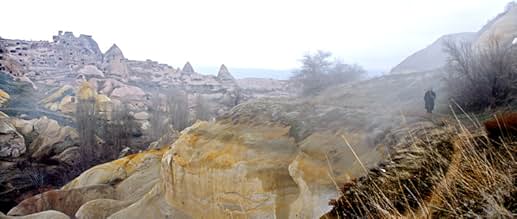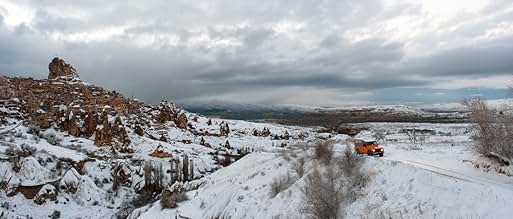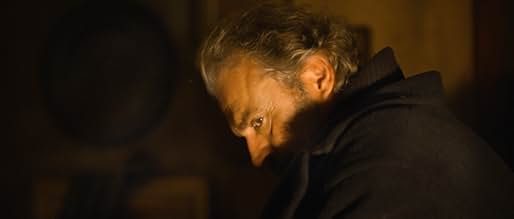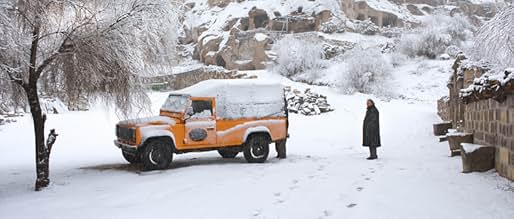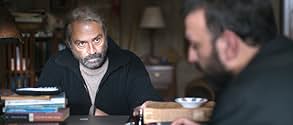IMDb रेटिंग
8.0/10
58 हज़ार
आपकी रेटिंग
एक दूरदराज के तुर्की गांव में एक होटल मालिक और मकान मालिक अपने परिवार और अपने किराए पर एक किरायेदार के भीतर संघर्ष से निपटते हैं।एक दूरदराज के तुर्की गांव में एक होटल मालिक और मकान मालिक अपने परिवार और अपने किराए पर एक किरायेदार के भीतर संघर्ष से निपटते हैं।एक दूरदराज के तुर्की गांव में एक होटल मालिक और मकान मालिक अपने परिवार और अपने किराए पर एक किरायेदार के भीतर संघर्ष से निपटते हैं।
- निर्देशक
- लेखक
- स्टार
- पुरस्कार
- 19 जीत और कुल 32 नामांकन
Serhat Mustafa Kiliç
- Imam Hamdi
- (as Serhat Kiliç)
फ़ीचर्ड समीक्षाएं
Have for a long time absolutely loved foreign language films, with 'Pan's Labyrinth' and 'A Very Long Engagement' making major impressions on me in school (and they are still favourites). Have actually seen very few Turkish films, but watched 'Winter Sleep' because of trusted friends raving over it and also the critical acclaim. With many recently seen highly regarded films being from my experience as great as said, expectations were high. The idea of the film also fascinated me.
'Winter Sleep' did not disappoint at all. Actually thought it one of the best films seen by me in a long time. The film is indeed long at nearly three and a half hours, but that didn't bother me. Having seen plenty of films with long lengths, some even longer, that still transfixed. It is indeed talk heavy, which is not always a good thing to me, depending on how good the talk is and how much is necessary. And it is indeed slow, or should we say deliberately, paced, but in my experience slow paced does not immediately equal bad (some of the best and most influential films ever made are slow).
Everything works. The scenery is absolutely breath taking, suitably bleak in parts but also hauntingly beautiful and atmosphere filled. The photography is quite stunning as well, really appreciated that there weren't any dizzying camera angles, fast cuts or slow motion, it is instead kept still and simple but is absolutely beautiful in that. It really makes the atmosphere speak for itself. The music is only used when necessary, but when it is used it is haunting and suitably melancholic.
The film is superbly scripted, as said it is heavy in talk. But it is truly thought provoking and powerful talk and all of it felt necessary and added a lot to the complexity of the characters. The story never felt dull and it didn't feel over-stretched either, it is not one of those films that tries to do too much narratively and takes its time to build but it really succeeds in making the tough, sensitive subject and themes bleakly uncompromising yet moving, making the intimacy of some of the storytelling really come to life emotionally and giving meat to the characters. The long length for me actually flew by.
Moreover, the lead character is not easy to get behind to begin with, but he does grow the more he understands what is going on around him, what his conflicts are doing to others and the more his motivations are understood. The film is sublimely acted, with Haluk Bilginer giving one of the best and most complex performances of the year that should have gotten more award recognition.
Summing up, absolutely wonderful. 10/10.
'Winter Sleep' did not disappoint at all. Actually thought it one of the best films seen by me in a long time. The film is indeed long at nearly three and a half hours, but that didn't bother me. Having seen plenty of films with long lengths, some even longer, that still transfixed. It is indeed talk heavy, which is not always a good thing to me, depending on how good the talk is and how much is necessary. And it is indeed slow, or should we say deliberately, paced, but in my experience slow paced does not immediately equal bad (some of the best and most influential films ever made are slow).
Everything works. The scenery is absolutely breath taking, suitably bleak in parts but also hauntingly beautiful and atmosphere filled. The photography is quite stunning as well, really appreciated that there weren't any dizzying camera angles, fast cuts or slow motion, it is instead kept still and simple but is absolutely beautiful in that. It really makes the atmosphere speak for itself. The music is only used when necessary, but when it is used it is haunting and suitably melancholic.
The film is superbly scripted, as said it is heavy in talk. But it is truly thought provoking and powerful talk and all of it felt necessary and added a lot to the complexity of the characters. The story never felt dull and it didn't feel over-stretched either, it is not one of those films that tries to do too much narratively and takes its time to build but it really succeeds in making the tough, sensitive subject and themes bleakly uncompromising yet moving, making the intimacy of some of the storytelling really come to life emotionally and giving meat to the characters. The long length for me actually flew by.
Moreover, the lead character is not easy to get behind to begin with, but he does grow the more he understands what is going on around him, what his conflicts are doing to others and the more his motivations are understood. The film is sublimely acted, with Haluk Bilginer giving one of the best and most complex performances of the year that should have gotten more award recognition.
Summing up, absolutely wonderful. 10/10.
A long theatrical play of dialogue and moods, thoughts and reflections, the absence of love or purpose, mixed with unchallenged and unsolved social inequalities, all placed into beautiful shots amid an astonishing natural environment. Very well played, with an almost unbearable iceberg of surpressed emotions and intellectually justified lack of action. Thought-provoking and emotionally touching, even if in a disturbing way.
This movie feels like you're peeking into the lives of these characters, and it can be very awkward.
The story is, basically, a conflict between a landlord and a tenant. The main landlord is kind of an asshole. He's snobbish and condescending, but the tenant isn't the most likeable either.
These characters feel like people. Flawed and conflicted. Their story is more fascinating to watch that it would seem at first.
The film is very long and very slow, but instead of being boring, it's relaxing, despite how unrelaxed the characters may be (they spend a lot of the time arguing). It's also really tense. Tense and relaxing. Oddly nostalgic.
If I were to compare it to a more recent movie, that would be Hu Bo's An Elephant Sitting Still.
The story is, basically, a conflict between a landlord and a tenant. The main landlord is kind of an asshole. He's snobbish and condescending, but the tenant isn't the most likeable either.
These characters feel like people. Flawed and conflicted. Their story is more fascinating to watch that it would seem at first.
The film is very long and very slow, but instead of being boring, it's relaxing, despite how unrelaxed the characters may be (they spend a lot of the time arguing). It's also really tense. Tense and relaxing. Oddly nostalgic.
If I were to compare it to a more recent movie, that would be Hu Bo's An Elephant Sitting Still.
All the movie scenes shooted in winter but somehow the movie gives incredible warmth, discussing delicate points like religion, poverty, honor, justice and love in magnificent way.
Ceylan's film is a film about the inherently destructive aspects of 'pride', tired old traditions, antiquated thinking, dishonesty (or at least being intentionally disingenuous), and letting your bitterness and resentment fester until it eats away too much of you and leaves you at odds with those closest to you, if not everyone.
क्या आपको पता है
- ट्रिवियाDirector Nuri Bilge Ceylan revealed that he had more than 200 hours of material and his original cut was 4 hours 30 minutes. He then "worked hard" to make it down to 3 hours 15 minutes.
- गूफ़The books in Aydin's hands change during the argument with his wife.
- कनेक्शनReferenced in Estrenos Críticos: Perdida, Sueño de Invierno y One Direction (2014)
- साउंडट्रैकSonata in A major D959 - Andantino
Composed by Franz Schubert
टॉप पसंद
रेटिंग देने के लिए साइन-इन करें और वैयक्तिकृत सुझावों के लिए वॉचलिस्ट करें
- How long is Winter Sleep?Alexa द्वारा संचालित
विवरण
- रिलीज़ की तारीख़
- कंट्री ऑफ़ ओरिजिन
- आधिकारिक साइट
- भाषाएं
- इस रूप में भी जाना जाता है
- Hibernation
- फ़िल्माने की जगहें
- उत्पादन कंपनियां
- IMDbPro पर और कंपनी क्रेडिट देखें
बॉक्स ऑफ़िस
- दुनिया भर में सकल
- $40,18,705
- चलने की अवधि3 घंटे 16 मिनट
- रंग
- ध्वनि मिश्रण
- पक्ष अनुपात
- 2.35 : 1
इस पेज में योगदान दें
किसी बदलाव का सुझाव दें या अनुपलब्ध कॉन्टेंट जोड़ें



